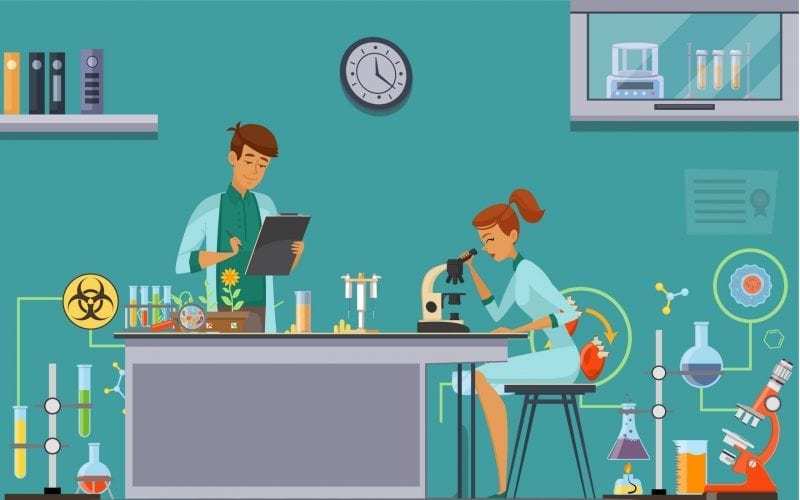Have you studied BiPC subjects? Do you want to explore a new frontier part from the conventional Medical Science courses? Then, pursuing a course in Biotechnology, which is also one of the most trending branches of Science and is gaining immense significance can be a suitable choice! Being a multidisciplinary field, Biotechnology encompasses the elements of science and technology in order to invent life-changing products. The theoretical and practical knowledge gained finds significant usage in the food and beverage industries, biological products, medicines, and the pharmaceutical sectors. Furthermore, many unique innovations in animal husbandry, agriculture, and environmental conservation have also been possible due to biotechnology. So, If you want to kickstart a Career in Biotechnology then here is a blog that will walk you through the steps needed to become a Biotechnologist!
This Blog Includes:
Step 1: Enroll in a Bachelor’s Degree
The first and foremost step to become a Biotechnologist is to pursue a bachelor’s degree like BTech/ Bachelor of Science [BSc] or some other variant related to the field. Bachelor level programs can equip you with the conventional knowledge of the domain. Academic institutions across the world offer scores of Biotechnology courses and their variants. Tabulated below are some of the programs which will provide you with quality education while taking you a step closer towards becoming a Biotechnologist.
| BTech Biotechnology | BSc Biotechnology | |
| BS in Biotechnology | BS with a Major in Biotechnology | |
| BS in Applied Molecular Biology and Biotechnology | BSc Biotechnology with Foundation Year |
Eligibility
What is important to note is that if you are planning to study abroad then you need to fulfil eligibility criteria as listed below:
- Completed formal schooling of 10+2 with BiPC subjects
- A good score in language proficiency tests like IELTS, TOEFL, etc
- LORs (Letter of Recommendation) and SOP (Statement of Purpose) also form an essential part of the application package.
Universities
The scope of Biotechnology is vast and on attaining overseas education, it further increases. Here is a list of universities where you can study the above-mentioned courses and take a step towards working as a Biotechnologist:
- Liverpool John Moores University
- University of Delaware
- Victoria University of Wellington
- Chalmers University of Technology
- University of Kent
- University of Hong Kong
- Queens’s University Belfast
- University of Missouri- St Louis
- The University of Newcastle
Step 2: Get Work Experience
Upon the completion of a bachelor’s degree, you should gain some industrial experience in order to polish your knowledge. Apart from scores of internship programs, entry-level jobs are also available wherein you can put to use the skills and knowledge acquired over the journey of the course and learn further about the field. Furthermore, gaining work experience will help you identify the area where you want to specialize and progress in your career as a Biotechnologist!
Step 3: Earn A Master’s Degree
To work at elite organizations as a Biotechnologist, you need to shine out from a pool of individuals. A multitude of postgraduate courses after BSc Biotechnology or BTech Biotechnology are available entering which you can add a feather to your hat by specializing in a subfield of your choice. Generally running for a period of 1-2 years, master level programs like MTech or MSc Biotechnology can cement your skills and equip you with an advanced knowledge of the domain.
Eligibility & Universities
[optin-monster-shortcode id=”xf2mlnjiouddzrshykdb”]As a part of entry requirements to study abroad, aspirants need to have an undergraduate degree with a minimum of 1-2 years of work experience in the relevant field. Let us take a look at various masters courses:
| MS in Applied Molecular Biology and Biotechnology | MTech Biotechnology | Professional Science Masters (PSM) in Biotechnology |
| MSc Medical Biotechnology | MS Biotechnology | MSc Marine Biodiversity and Biotechnology |
| MSc in Material Chemistry with major in Biotechnology | MSc Biotechnology and Bioengineering | Industrial Biotechnology |
Step 4: PhD
Though you will find ample employment opportunities in various sectors after completing your master’s degree but to build a promising career as a Biotechnologist, opting for a PhD can be a step in the right direction. If your interest lies in academia, doctorate degree would be the best option. A doctoral program demands you to delve deep into the research practices related to the basic or life sciences apart from other facets of biotechnology.
Bioinformatics, Medical Imaging, Pharmaceutical Technology, Biochemistry, etc are some of the areas you can gain expertise in. At the end of this 3-5 year course, you have to submit a thesis in order to obtain the degree.
Thus, we hope that this blog about how to become a Biotechnologist has provided you with ample information. If you are unsure about the specialisations, reach out to Leverage Edu experts who will assess your profile and will recommend the courses most suitable for you and will also help in completing admission formalities so that you enter your dream university hassle-free!

 One app for all your study abroad needs
One app for all your study abroad needs






















 45,000+ students realised their study abroad dream with us. Take the first step today.
45,000+ students realised their study abroad dream with us. Take the first step today.

